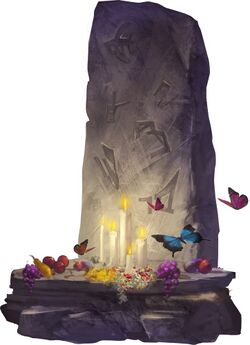Desna (DEZ-nuh)
Desna was one of the first deities, but while her peers burdened themselves with the task of creating Golarion, she spent her time building the heavens. She knew that there would be plenty of time for her and her followers to explore the many wonders of the world later. She's changed little since those earlier days, and she and her followers delight in exploring the world.
History
Desna is an ancient goddess of freedom and luck, and is credited with the creation of the heavens. According to the Windsong Testaments, she was one of the first eight deities of this incarnation of reality. In her earliest days, the god Curchanus, an enemy of the goddess Lamashtu, was her mentor. Lamashtu laid a trap for Curchanus and stripped him of his beast domain, ripping it from his godly essence. As he died, he gifted Desna with the domain of travel; she has traveled the planes and worlds since, opposing both oppression and Lamashtu wherever she encounters them, and spreading her word while making an effort to experience new wonders when she can.Appearance
Desna is a Varisian goddess often described as a beautiful elven woman, with butterfly wings containing all the beauty of a clear night sky. She is often depicted as having dark hair, silvery eyes, and a coy but distant smile, wearing diaphanous gowns and sometimes accompanied by swarms of butterflies.Providence
Desna generally communicates with her followers through dreams, sending images, feelings, or even prophecies that stick in the recipient's mind after waking. If there is not enough time for dreams, or they are otherwise unsuitable, she can send swarms of butterflies, sparrows, dragonflies, or geese that fly in a four-pointed star shape. When displeased, she can withhold a restful sleep, make sure the mortal gets sore feet, has a travel accident, or that a messenger animal loses its way.Servants
Desna and her faithful hold creatures that symbolize freedom and the night sky as beautiful and holy. Butterflies are a particular favorite, and the appearance of swarms of them is often seen as a sign of the goddess' favor. Other favored creatures include star monarchs and certain fey creatures of the night.Church of Desna
Desna is the goddess of travel and journeys, and there are few who traverse the roads who wouldn't spare her a prayer or a simple-worded plea for benediction. Scouts, sailors, and those who travel for travel's sake make up a large number of her followers, though her focus on luck also makes her a favorite deity among gamblers and thieves. Whatever their calling, followers of the Song of Spheres search the world for new experiences, and try to live their life to the fullest. The church of Desna has few temples, as its priests rarely settle in a single location. The faithful of the Great Dreamer can be found on the roads of Golarion, and especially among the Varisian caravans and others who who call the road their home and enjoy the beauty of the wilderness. Other centers of worship include the River Kingdoms, the Steaming Sea, and Ustalav. She is also revered by numerous Kellids, Mwangi, Shoanti, Tian, Ulfen, Varisians, elves, gnomes, and half-elves throughout the Inner Sea region.Clergy
The informal clergy of Desna is primarily composed of clerics, though on occasion bards are called by some song or whisper in the night to follow her path. In addition, spherewalkers are paragons of the Desnan ideal: they see new sights each day and discover unheard of locales. Her clergy usually garb themselves in white robes with black trim and silk caps, highlighted by varied decorative elements (especially among priests of high status), and usually accompanied by one or more starknives.Temples and Shrines
Temples of Desna are few and far between, with most locations no more than roadside shrines erected in her honor. Travelers often leave markings and dedications in newly discovered areas and secluded locales. Those few temples that do exist often serve as observatories and are open to the night sky, with plentiful texts, charts, and instruments to help track the stars and determine astronomical events. Dedicated to the faith of Desna, seven bell towers are believed to have existed at one point throughout the Inner Sea. The seven towers represented the Seven Towers of Desna's palace and each tower housed a sacred Bell of Mercy. Pilgrimages to all seven towers were often undertaken by Desna's faithful.Holy Texts
Writings sacred to Desna tend to be easily portable, written in simple language and often containing references to exotic, beautiful places and roads containing a shrine.The Eight Scrolls
These writings detail Desna's early days and the basic edicts of her faith.Shrine Wall Writings
Almost all Desnan shrines are covered with the observations and prayers of travelers and priests of her faith, containing the wisdom of the road and hints for the start of new journeys.Holidays
The spring month of Desnus is named in honor of the goddess, although it is not a holiday.Ritual of Stardust
This holiday takes place on both the winter and summer solstices. When the ceremonial fires burn low, the faithful throw sand mixed with gems into the embers and make wishes and pledges for the months to come.Swallowtail Festival
Every year on the first day of the month of Rova, the followers of Desna release cages full of swallowtail butterflies, an act that honors a story told by the faithful.Favored Animals
Gods are often associated with certain animals, either because they possess a quality that the god favors, or because the god's faithful feel a special kinship to it. Desna's favored animals include butterflies, moths, caterpillars, owls, sparrows, dragonflies, and messenger birds.
Related Ethnicities



